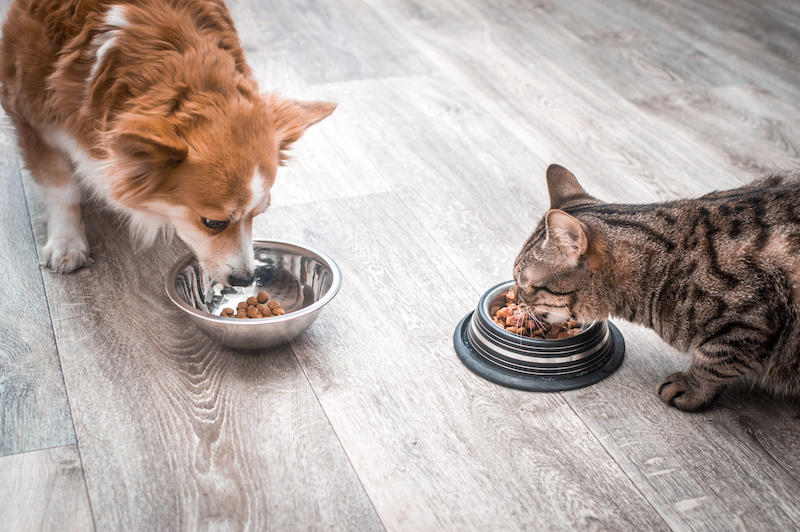You are probably hearing about the FDA report on cases of Dilated Cardiomyopathy (DCM) in dogs and cats and the “possible” correlation between “grain-free” diets.
When making changes in your animal’s diet, it is important to consider the facts. And, whenever possible please consult with a holistic veterinary who is trained in nutrition. You can search here for someone in your area: American Holistic Veterinary Medical Association
Here is what is known from the Pet Food FDA study so far:
- The condition is Dilated Cardiomyopathy, DCM – a serious heart condition and might be linked to an inadequate quantity of Taurine necessary for dogs.
- NO conclusion has been made by the FDA stating “grain-free” diets are causing DCM in dogs or cats. There has not been a study on grain-free diets versus diets with grain to determine health risks or benefits.
- The FDA is continuing to investigate other possible causes of DCM unrelated to diet (breed temperaments, breed genetics, taurine deficiency, poison ingestion)
- There are approximately 77 million pet dogs in the U.S. according to the American Veterinary Medical Association, this study is basing the assumptions on 524 reports of DCM (515 canines, 9 felines) between January 1, 2014, and April 30, 2019.
- The last FDA report states: “To date, the FDA has not established why certain diets may be associated with the development of DCM in some dogs. In the meantime, and before making diet changes, pet owners should work directly with their veterinarians, who may consult with a board-certified veterinary nutritionist, to determine the most appropriate diet for their pet’s specific needs.” -FDA Report, 6/27/2019
- The information coming forward about grain-free dry dog food as a possible link to heart issues in dogs was gathered by looking at commonalities in the dogs being diagnosed. This was not research or a study on grain-free diets. Important to note also is the fact that some of the dogs were not on grain-free food.
- The FDA acknowledges there is not sufficient data to conclude that specific foods caused the problem.
- Many pet foods now contain legumes as fillers instead of grain to hold together dry kibble. The proteins in legumes are not easily processed and utilized by animals.
- If a product has legumes, peas, lentils, garbanzo beans or something similar listed very high on the list of ingredients, you may want to avoid that product, especially if there are more than two legumes as a protein source.
- There are very high numbers of dogs eating grain-free diets that have not developed DCM. No research has been done so we cannot state an exact number; however, because we have millions of dogs in the U.S., it is safe to say there are at least tens of thousands of dogs living healthy lives with the benefits of a grain-free diet.
- Food without grains is not a cause of health issues in dogs or cats. Some processed pet food advocates are trying to push you back in the direction of grain-based diets. They are more profitable because the grain is cheaper. Don’t be fooled. The problem lies with high levels of starchy carbohydrates coupled with the extreme high-heat processing methods used to produce these diets.
- Recent FDA statement made in an article dated December 27, 2019: “At this time, it is not clear what it is about some diets that may be connected to DCM in dogs, but FDA believes it may be multi-factorial,” said Monique Richards, an FDA spokesperson. “There are multiple possible causes of DCM.”
Once upon a time, dog food had one or two grains in it and health complications were minimal. However, the pet food industry then added more grains as fillers to increase their profits. Many low-end dog foods now have four or five grains. So please don’t just switch to another food with grains or new complications that may arise.
Beware of too many grains! They can cause issues such as obesity, arthritis, and digestive disorders. That is why new pet food companies came forward with healthier grain-free diets in the first place. Now, we are learning perhaps they added too many legumes. So read the ingredients on your dog food bags. Strive for no more than 2 legumes and if you wish to have grains in your dog’s diet, then no more than 2 grains. READ THE INGREDIENTS LIST, not just the marketing info on the front of packaging.
Meat is essential for dogs and critically important for cats. Be sure you are providing a good quality product with healthy meat sources (not “meat by-products”). Canned food or raw meat pet products combined with dry food is a good way to afford a healthy diet for your dogs. And, remember, every animal has unique needs based on size, age, genetics, and health conditions. Please learn the facts and consult with a nutrition trained veterinarian.
There are helpful FREE podcasts on my website on Dog Nutrition and Cat Nutrition. They were recorded in the past and not specific to the current news. These one hour talks, with guest holistic veterinarians, can provide you a good sense of how to feed your animal companions.
Click here to listen to the FREE Podcast on Dog & Cat Nutrition
(simply scroll down the page for access to various podcasts)
RESOURCES TO LEARN MORE:
DCM and Diet in Dogs and Cats– American Veterinary Medical Association
Potential Link Between Certain Diets and DCM– Food and Drug Administration – FDA
Q & A FDA Investigates Potential Link Between Diets and DCM– Food and Drug Administration
“Bad Science and Big Business Are Behind the Biggest Pet Food Story in a Decade” by Daniel Schulof
“Dogs Fed Grain-Free Kibble May Be At Risk of Heart Disease” by Dr. Karen Becker, DVM

